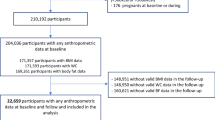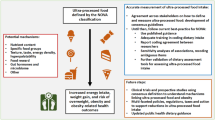Abstract
Purpose
Regarding the importance of obesity concerns and trying to help obese individuals, we planned to develop an effective probiotic formula for weight control. So, this double-blind randomized clinical trial study investigated the impact of probiotics supplementation on anthropometric and biochemical parameters in obese adults.
Methods
In this study, 66 obese patients with BMI in the range of 30–40 kg/m2, were enrolled and randomly assigned to either the probiotic or placebo group. They all received advice to maintain a reduction in daily caloric intake and for 3 months received two unlabeled placebo or probiotic (Lactobacillus plantarum, Lactobacillus rhamnosus, Lactobacillus casei and Bifidobacterium langum) capsules per day. For each participant demographic and medical history questionnaire, semi-quantitative food frequency questionnaire (FFQ), and modifiable activity questionnaire (MAQ) were completed at the beginning of the study and anthropometric and biochemical measurements were done before and after intervention.
Results
At the end of the trial 25 subjects in the probiotic group and 26 subjects in the placebo group were analyzed. After the intervention, in the probiotic group, the level of fasting insulin was reduced significantly (P < 0.05). Weight, body mass index, waist circumference, and hip circumference decreased within both groups. This reduction amount’s mean was higher in the probiotic group. Also, total cholesterol, triglycerides, and LDL levels were decreased, but not statistically significant.
Conclusion
This study may suggest the potential of this combined probiotic supplement for treating obesity and related metabolic disorders. However, further researches are warranted for a definitive determination of its properties.

Similar content being viewed by others
Data availability
The primary data for this study is available from the authors on direct request.
References
Friedman JM, Obesity. Causes and control of excess body fat. Nature. 2009;459(7245):340–2. https://doi.org/10.1038/459340a.
Aoun A, Darwish F, Hamod N. The influence of the gut microbiome on obesity in adults and the role of Probiotics, Prebiotics, and Synbiotics for Weight loss. Prev Nutr food Sci. 2020;25(2):113–23. https://doi.org/10.3746/pnf.2020.25.2.113.
Baothman OA, Zamzami MA, Taher I, Abubaker J, Abu-Farha M. The role of gut microbiota in the development of obesity and diabetes. Lipids Health Dis. 2016;15(1):108. https://doi.org/10.1186/s12944-016-0278-4.
Laparra JM, Sanz Y. Interactions of gut microbiota with functional food components and nutraceuticals. Pharmacol Res. 2010;61(3):219–25. https://doi.org/10.1016/j.phrs.2009.11.001.
Festi D, Schiumerini R, Eusebi LH, Marasco G, Taddia M, Colecchia A. Gut microbiota and metabolic syndrome. World J Gastroenterol. 2014;20(43):16079–94. https://doi.org/10.3748/wjg.v20.i43.16079.
Hill C, Guarner F, Reid G, Gibson GR, Merenstein DJ, Pot B, et al. Expert consensus document. The International Scientific Association for Probiotics and Prebiotics consensus statement on the scope and appropriate use of the term probiotic. Nat Rev Gastroenterol Hepatol. 2014;11(8):506–14. https://doi.org/10.1038/nrgastro.2014.66.
Plaza-Diaz J, Ruiz-Ojeda FJ, Gil-Campos M, Gil A. Mechanisms of action of Probiotics. Advances in nutrition (Bethesda. Md). 2019;10(suppl1):49–S66. https://doi.org/10.1093/advances/nmy063.
Cai Y, Liu P, Zhou X, Yuan J, Chen Q. Probiotics therapy show significant improvement in obesity and neurobehavioral disorders symptoms. Front Cell Infect Microbiol. 2023;13:1178399. https://doi.org/10.3389/fcimb.2023.1178399.
Shirvani-Rad S, Tabatabaei-Malazy O, Mohseni S, Hasani-Ranjbar S, Soroush AR, Hoseini-Tavassol Z, et al. Probiotics as a complementary therapy for management of obesity: a systematic review. Evid Based Complement Alternat Med. 2021;2021:6688450. https://doi.org/10.1155/2021/6688450.
Gabriel FC, Fantuzzi G. The association of short-chain fatty acids and leptin metabolism: a systematic review. Nutr Res. 2019;72:18–35. https://doi.org/10.1016/j.nutres.2019.08.006.
Alvarez-Arrano V, Martin-Pelaez S. Effects of Probiotics and Synbiotics on Weight loss in subjects with overweight or obesity: a systematic review. Nutrients. 2021;13(10):3627. https://doi.org/10.3390/nu13103627.
Le Barz M, Daniel N, Varin TV, Naimi S, Demers-Mathieu V, Pilon G, et al. In vivo screening of multiple bacterial strains identifies Lactobacillus rhamnosus Lb102 and Bifidobacterium animalis ssp. lactis Bf141 as probiotics that improve metabolic disorders in a mouse model of obesity. FASEB J. 2019;33(4):4921–35. https://doi.org/10.1096/fj.201801672R.
Nova E, Perez de Heredia F, Gomez-Martinez S, Marcos A. The role of Probiotics on the Microbiota: effect on obesity. Nutr Clin Pract. 2016;31(3):387–400. https://doi.org/10.1177/0884533615620350.
Razmpoosh E, Ejtahed HS, Mirmiran P, Javadi M. Role of Probiotics in Glycemic controls and Body Weight in Type 2 diabetes: a systematic of Human and Animal studies. Iran J Endocrinol Metabolism. 2015;17(1):63–87.
Mekkes MC, Weenen TC, Brummer RJ, Claassen E. The development of probiotic treatment in obesity: a review. Benef Microbes. 2014;5(1):19–28. https://doi.org/10.3920/BM2012.0069.
Esfahani FH, Asghari G, Mirmiran P, Azizi F. Reproducibility and relative validity of food group intake in a food frequency questionnaire developed for the Tehran lipid and glucose study. J Epidemiol. 2010;20(2):150–8. https://doi.org/10.2188/jea.je20090083.
Mirmiran P, Esfahani FH, Mehrabi Y, Hedayati M, Azizi F. Reliability and relative validity of an FFQ for nutrients in the Tehran lipid and glucose study. Public Health Nutr. 2010;13(5):654–62. https://doi.org/10.1017/S1368980009991698.
Momenan AA, Delshad M, Sarbazi N, Rezaei Ghaleh N, Ghanbarian A, Azizi F. Reliability and validity of the Modifiable Activity Questionnaire (MAQ) in an Iranian urban adult population. Arch Iran Med. 2012;15(5):279– 82. https://doi.org/012155/AIM.007
Park SY, Gautier JF, Chon S. Assessment of insulin secretion and insulin resistance in human. Diabetes Metabolism J. 2021;45(5):641–54. https://doi.org/10.4093/dmj.2021.0220.
Ejtahed HS, Tito RY, Siadat SD, Hasani-Ranjbar S, Hoseini-Tavassol Z, Rymenans L, et al. Metformin induces weight loss associated with gut microbiota alteration in non-diabetic obese women: a randomized double-blind clinical trial. Eur J Endocrinol. 2019;180(3):165–76. https://doi.org/10.1530/eje-18-0826.
Dong Y, Xu M, Chen L, Bhochhibhoya A. Probiotic foods and supplements interventions for metabolic syndromes: a systematic review and Meta-analysis of recent clinical trials. Ann Nutr Metab. 2019;74(3):224–41. https://doi.org/10.1159/000499028.
Koutnikova H, Genser B, Monteiro-Sepulveda M, Faurie JM, Rizkalla S, Schrezenmeir J, et al. Impact of bacterial probiotics on obesity, diabetes and non-alcoholic fatty liver disease related variables: a systematic review and meta-analysis of randomised controlled trials. BMJ Open. 2019;9(3):e017995. https://doi.org/10.1136/bmjopen-2017-017995.
Wang ZB, Xin SS, Ding LN, Ding WY, Hou YL, Liu CQ, et al. The potential role of Probiotics in Controlling Overweight/Obesity and Associated Metabolic Parameters in adults: a systematic review and Meta-analysis. Evid Based Complement Alternat Med. 2019;2019:3862971. https://doi.org/10.1155/2019/3862971.
Cao S, Ryan PM, Salehisahlabadi A, Abdulazeem HM, Karam G, Černevičiūtė R, et al. Effect of probiotic and synbiotic formulations on anthropometrics and adiponectin in overweight and obese participants: a systematic review and meta-analysis of randomized controlled trials. J King Saud Univ - Sci. 2020;32(2):1738–48. https://doi.org/10.1016/j.jksus.2020.01.011.
Crovesy L, Ostrowski M, Ferreira DMTP, Rosado EL, Soares-Mota M. Effect of Lactobacillus on body weight and body fat in overweight subjects: a systematic review of randomized controlled clinical trials. Int J Obes. 2017;41(11):1607–14. https://doi.org/10.1038/ijo.2017.161.
Sanchez M, Darimont C, Panahi S, Drapeau V, Marette A, Taylor VH, et al. Effects of a Diet-Based weight-reducing program with probiotic supplementation on Satiety Efficiency, eating Behaviour traits, and Psychosocial behaviours in obese individuals. Nutrients. 2017;9(3):284. https://doi.org/10.3390/nu9030284.
Sanchez M, Darimont C, Drapeau V, Emady-Azar S, Lepage M, Rezzonico E, et al. Effect of Lactobacillus rhamnosus CGMCC1.3724 supplementation on weight loss and maintenance in obese men and women. Br J Nutr. 2013;111(8):1507–19. https://doi.org/10.1017/S0007114513003875.
Jung S, Lee YJ, Kim M, Kim M, Kwak JH, Lee J-W, et al. Supplementation with two probiotic strains, Lactobacillus curvatus HY7601 and Lactobacillus plantarum KY1032, reduced body adiposity and Lp-PLA2 activity in overweight subjects. J Funct Foods. 2015;19:744–52. https://doi.org/10.1016/j.jff.2015.10.006.
Sun J, Buys N. Effects of probiotics consumption on lowering lipids and CVD risk factors: a systematic review and meta-analysis of randomized controlled trials. Ann Med. 2015;47(6):430–40. https://doi.org/10.3109/07853890.2015.1071872.
Gadelha C, Bezerra AN. Effects of probiotics on the lipid profile: systematic review. Jornal Vascular Brasileiro. 2019;18:e20180124. https://doi.org/10.1590/1677-5449.180124.
Noriega L, Cuevas I, Margolles A, de los Reyes-Gavilán CG. Deconjugation and bile salts hydrolase activity by Bifidobacterium strains with acquired resistance to bile. Int Dairy J. 2006;16(8):850–5. https://doi.org/10.1016/j.idairyj.2005.09.008.
Wang LX, Liu K, Gao DW, Hao JK. Protective effects of two Lactobacillus plantarum strains in hyperlipidemic mice. World J Gastroenterol. 2013;19(20):3150–6. https://doi.org/10.3748/wjg.v19.i20.3150.
Rajkumar H, Mahmood N, Kumar M, Varikuti SR, Challa HR, Myakala SP. Effect of probiotic (VSL#3) and omega-3 on lipid profile, insulin sensitivity, inflammatory markers, and gut colonization in overweight adults: a randomized, controlled trial. Mediat Inflamm. 2014;2014:348959. https://doi.org/10.1155/2014/348959.
Khalili L, Alipour B, Asghari Jafarabadi M, Hassanalilou T, Mesgari Abbasi M, Faraji I. Probiotic assisted weight management as a main factor for glycemic control in patients with type 2 diabetes: a randomized controlled trial. Diabetol Metab Syndr. 2019;11(1):5. https://doi.org/10.1186/s13098-019-0400-7.
Bourebaba L, Marycz K. Pathophysiological implication of Fetuin-A glycoprotein in the development of metabolic disorders: a concise review. J Clin Med. 2019;8(12). https://doi.org/10.3390/jcm8122033.
Ye X, Li M, Hou T, Gao T, Zhu WG, Yang Y. Sirtuins in glucose and lipid metabolism. Oncotarget. 2017;8(1):1845–59. https://doi.org/10.18632/oncotarget.12157.
Markowiak-Kopeć P, Śliżewska K. The Effect of Probiotics on the production of short-chain fatty acids by human intestinal microbiome. Nutrients. 2020;12(4). https://doi.org/10.3390/nu12041107.
da Silva AA, do Carmo JM, Hall JE. CNS regulation of glucose homeostasis: role of the leptin-melanocortin system. Curr Diab Rep. 2020;20(7):29. https://doi.org/10.1007/s11892-020-01311-1.
Münzberg H, Singh P, Heymsfield SB, Yu S, Morrison CD. Recent advances in understanding the role of leptin in energy homeostasis. F1000Research. 2020;9. https://doi.org/10.12688/f1000research.24260.1.
den Besten G, van Eunen K, Groen AK, Venema K, Reijngoud DJ, Bakker BM. The role of short-chain fatty acids in the interplay between diet, gut microbiota, and host energy metabolism. J Lipid Res. 2013;54(9):2325–40. https://doi.org/10.1194/jlr.R036012.
Wróblewski A, Strycharz J, Świderska E, Drewniak K, Drzewoski J, Szemraj J, et al. Molecular insight into the Interaction between epigenetics and Leptin in Metabolic disorders. Nutrients. 2019;11(8). https://doi.org/10.3390/nu11081872.
Dubern B, Clément K, Pelloux V, Froguel P, Girardet JP, Guy-Grand B, et al. Mutational analysis of melanocortin-4 receptor, agouti-related protein, and alpha-melanocyte-stimulating hormone genes in severely obese children. J Pediatr. 2001;139(2):204–9. https://doi.org/10.1067/mpd.2001.116284.
Soldavini J, Kaunitz JD. Pathobiology and potential therapeutic value of intestinal short-chain fatty acids in gut inflammation and obesity. Dig Dis Sci. 2013;58(10):2756–66. https://doi.org/10.1007/s10620-013-2744-4.
Kullisaar T, Zilmer K, Salum T, Rehema A, Zilmer M. The use of probiotic L. Fermentum ME-3 containing Reg’activ cholesterol supplement for 4 weeks has a positive influence on blood lipoprotein profiles and inflammatory cytokines: an open-label preliminary study. Nutr J. 2016;15(1):93. https://doi.org/10.1186/s12937-016-0213-6.
Zarrati M, Salehi E, Mofid V, Zadeh-Attar MJH, Nourijelyani K, Bidad K et al. Relationship between probiotic consumption and IL-10 and IL-17 secreted by PBMCs in overweight and obese people. Iran J Allergy Asthma Immunol. 2013:404–6.
Acknowledgements
The tablets were kindly provided by Takgene Zist Co., Iran.
Funding
This study was funded by the Endocrinology and Metabolism Research Institute, Tehran University of Medical Sciences, Tehran, Iran (Number: 1397–02-108–2299).
Author information
Authors and Affiliations
Contributions
SHR: Conceptualization, designing, project administration, supervision, writing– review & editing. ZHT: Investigation, writing– original draft. HM: Investigation, writing– review & editing. HSE: Conceptualization, designing, supervision, writing– review & editing. MET and BL: Conceptualization, writing– review & editing. All authors reviewed and approved the final manuscript.
Corresponding authors
Ethics declarations
Consent for publication
Not applicable.
Competing interests
The authors declare that there is no conflict of interest.
Additional information
Publisher’s Note
Springer Nature remains neutral with regard to jurisdictional claims in published maps and institutional affiliations.
Rights and permissions
Springer Nature or its licensor (e.g. a society or other partner) holds exclusive rights to this article under a publishing agreement with the author(s) or other rightsholder(s); author self-archiving of the accepted manuscript version of this article is solely governed by the terms of such publishing agreement and applicable law.
About this article
Cite this article
Hasani-Ranjbar, S., Hoseini Tavassol, Z., Malmir, H. et al. Investigation of the probiotic supplement’s effect on obese adults demonstrated a reduction in fasting insulin levels: a double-blind randomized clinical trial. J Diabetes Metab Disord (2024). https://doi.org/10.1007/s40200-024-01400-y
Received:
Accepted:
Published:
DOI: https://doi.org/10.1007/s40200-024-01400-y




